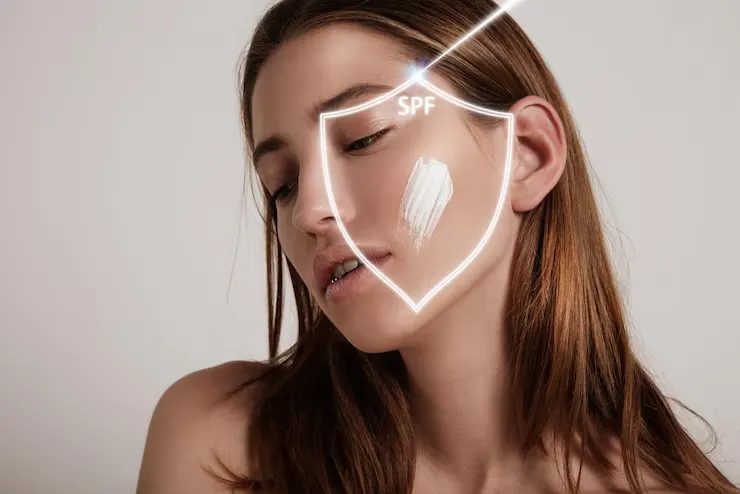In the world of skincare, one product consistently tops the list of must-haves—sunscreen. Whether it’s a sunny day at the beach or a cloudy morning commute, applying sunscreen should be a daily ritual. It’s not just about preventing sunburn; it’s about preserving the health, texture, and appearance of your skin.
What Is Sunscreen & How Does It Work?
Sunscreen is a skincare product designed to protect the skin from the harmful effects of ultraviolet (UV) radiation. There are two types of UV rays that affect the skin:
- UVA rays: Cause premature aging and long-term skin damage.
- UVB rays: Cause sunburn and play a key role in the development of skin cancer.
Most sunscreens are labeled as broad-spectrum, meaning they offer protection against both UVA and UVB rays. Sunscreen works by either absorbing UV radiation (chemical sunscreens) or reflecting it away (physical sunscreens). This shield helps prevent damage to the skin cells and reduces the risk of long-term issues.
The importance of sunscreen lies in this very mechanism—by blocking or filtering harmful UV rays, it preserves the skin’s health and appearance.
Importance of Sunscreen in Daily Life
Sunscreen isn’t just for vacations or summer outings. It plays a crucial role in everyday skincare, no matter the weather or location.
- UV rays penetrate clouds: Even on overcast days, up to 80% of UV radiation reaches the earth.
- Indoor exposure matters: UVA rays can pass through windows, affecting your skin even when you’re inside.
- Prevents long-term skin damage: Regular use slows the effects of photoaging such as wrinkles, fine lines, and spots.
- Reduces risk of skin cancer: According to dermatologists, daily sunscreen use is one of the most effective ways to lower your risk.
The importance of sunscreen becomes even more apparent when you realize its impact goes beyond short-term sunburn prevention.
Key Benefits of Sunscreen
There are numerous benefits of sunscreen for people of all skin tones, ages, and lifestyles:
- Anti-aging Effects: Sunscreen helps prevent premature signs of aging such as wrinkles and age spots caused by sun exposure.
- Even Skin Tone: It protects against discoloration and uneven pigmentation.
- Prevents Hyperpigmentation: Especially important for those prone to melasma or dark spots.
- Maintains Skin Barrier: Sunscreen protects sensitive or damaged skin from worsening.
- Protects All Skin Types: Including oily, dry, acne-prone, or sensitive skin.
Daily use provides cumulative protection, making these benefits of sunscreen essential for maintaining youthful and healthy skin over time.
Understanding SPF
SPF, or Sun Protection Factor, is a measure of how well a sunscreen protects against UVB rays.
- SPF 30 blocks about 97% of UVB rays
- SPF 50 blocks about 98%
- SPF 100 blocks roughly 99%
While higher SPFs offer more protection, no sunscreen can block 100% of UV rays. For most people, SPF 30 or higher is recommended.
Tips for using SPF effectively:
- Apply 15–30 minutes before sun exposure.
- Reapply every 2 hours—or more often if swimming or sweating.
- Use sunscreen even indoors if you’re near windows.
Understanding SPF helps in making informed decisions about how to protect your skin in different environments.
Who Should Use Sunscreen?
The short answer: everyone.
- All skin tones: Melanin provides some natural protection but not enough to prevent damage.
- All genders: Skin protection is not just a cosmetic concern.
- All ages: Even children and teens should wear sunscreen, though baby-safe formulas are advised for infants older than 6 months.
In short, the importance of sunscreen applies universally—it’s not exclusive to any one group.
Sunscreen Myths Busted
Despite growing awareness, several myths still exist around sunscreen:
- “I don’t need sunscreen if I have dark skin.” Everyone is at risk for sun damage and skin cancer.
- “I only need sunscreen when it’s sunny.” UV rays can penetrate clouds and windows.
- “A high SPF means I don’t need to reapply.” Even SPF 50 should be reapplied every 2 hours.
- “Sunscreen causes breakouts.” Choose non-comedogenic formulas for acne-prone skin.
Addressing these misconceptions strengthens the message around the importance of sunscreen in everyday life.
How to Choose the Right Sunscreen
Selecting the right sunscreen depends on your skin type and preferences:
- Chemical Sunscreens: Absorb UV rays. Lightweight and often preferred for daily wear.
- Physical (Mineral) Sunscreens: Reflect UV rays. Great for sensitive skin.
Considerations for choosing sunscreen:
- Skin type: Oily skin may benefit from gel-based or mattifying sunscreens.
- Activity level: Water-resistant formulas are ideal for outdoor sports.
- Concerns: Look for ingredients like niacinamide or hyaluronic acid for added skincare benefits.
Choosing wisely maximizes the benefits of sunscreen and ensures consistent use.
FAQs About Sunscreen
Can I skip sunscreen on cloudy days?
No. UV rays still penetrate through clouds and can damage your skin.
How often should I reapply sunscreen?
Every 2 hours, and more often if you’re sweating or swimming.
Is sunscreen safe for children and babies?
Yes, for babies over 6 months. Choose formulas made specifically for children.
What’s the difference between SPF 30 and SPF 50?
SPF 30 blocks 97% of UVB rays, while SPF 50 blocks 98%. The difference is small, but SPF 50 offers slightly more protection.
Why Choose Us?
Choose us as your trusted dermatology services for exceptional skin, hair, and nail care. We prioritize your skin health with a patient-centered approach, offering personalized treatments for a wide range of dermatological concerns. Our commitment to accessibility, responsiveness, and compassionate care ensures you receive expert guidance at every step of your skincare journey. Stay informed, proactive, and discover the importance of healthy skin for overall well-being. To learn more, contact us at 9987558210 or visit www.drujjvalajadhav.com
